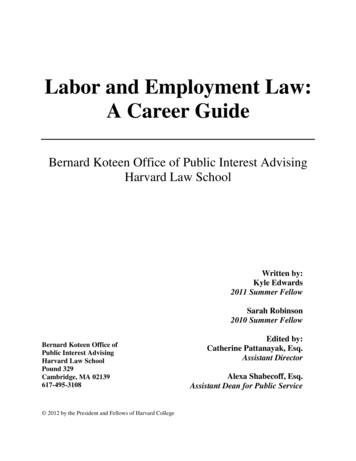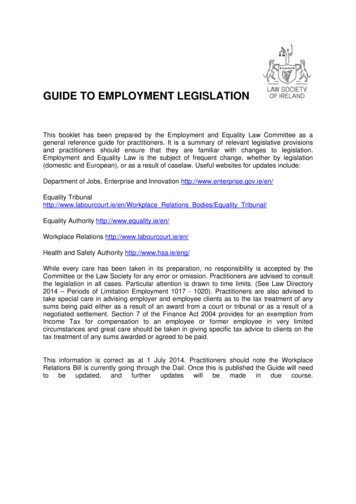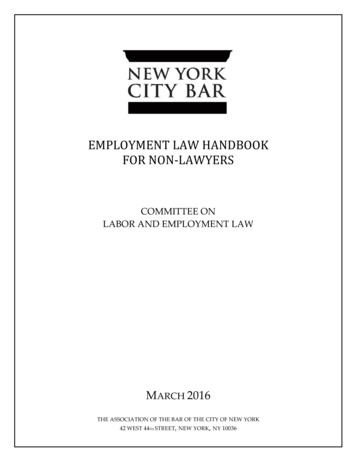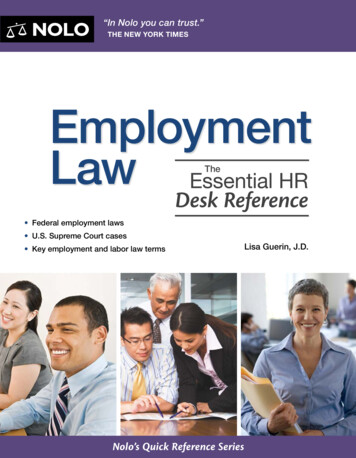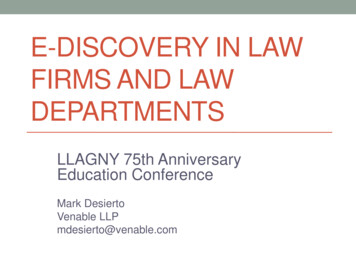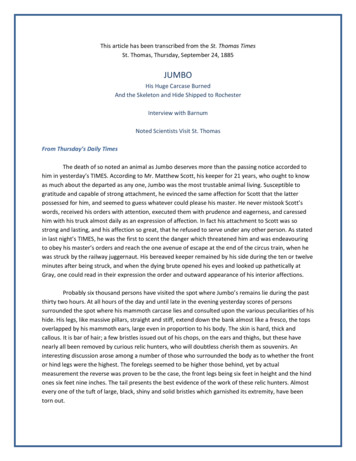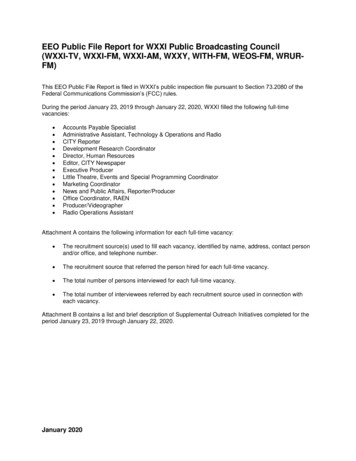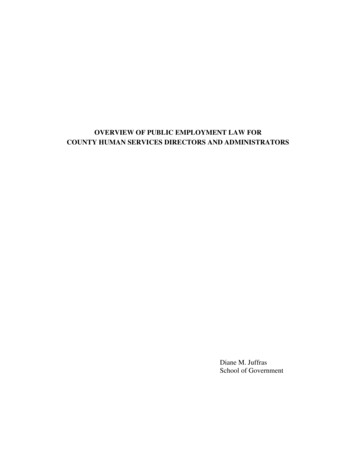
Transcription
OVERVIEW OF PUBLIC EMPLOYMENT LAW FORCOUNTY HUMAN SERVICES DIRECTORS AND ADMINISTRATORSDiane M. JuffrasSchool of Government
The Legal Basis for County Human Resources AdministrationA. Personnel Authority of the Board of County Commissioners:- The Board of Commissioners may create, change, abolish, and consolidate offices, positions,departments, boards, commissions, and agencies of county government, may impose exofficio the duties of more than one office on a single officer, may change the compositionand manner of selection of boards, commissions, and agencies, and may generally organizeand reorganize the county government in order to promote orderly and efficientadministration of county affairs, subject to the limitations set forth in this section.see General Statutes § 153A-76.- The board may adopt personnel rules and policies that promote the hiring and retention ofcapable, diligent, and honest career employees.see General Statutes § 153A-94.- The board may establish and maintain a personnel system for all employees subject to theState Personnel Act which is "substantially equivalent" to standards established by the Act.see General Statutes § 126-11 (a).B. Hiring and Firing Authority.- In counties not having a county manager, the board of commissioners shall appoint, suspend,and remove all county officers, employees, and agents except those who are elected by thepeople or whose appointment is otherwise provided for by law.see General Statutes § 153A-87.- Counties may adopt manager plan, with manager to serve at the pleasure of the board ofcommissioners.see General Statutes § 153A-81.- Manager shall appoint with the approval of the board of commissioners and suspend or removeall county officers, employees, and agents except those who are elected by the people or whoseappointment is otherwise provided for by law. The board may by resolution permit the managerto appoint officers, employees, and agents without first securing the board's approval.see General Statutes § 153A-82.- Officers whose appointment and dismissal is required by law to be made by the Board ofCommissioners. Clerk to the board, who serves at the pleasure of the board; see General Statutes § 153A-111. County attorney, who serves at the pleasure of the board; see General Statutes § 153A-114. Tax collector, to serve for a term to be determined by the board. Removal for good causeafter written notice and opportunity for hearing at public session, except no hearingrequired if removal for failing to properly deliver tax receipts;see General Statutes § 105-349(a). Deputy tax collector, to serve for a term to be determined by the board;see General Statutes § 105-349(f).2
County assessor, to serve a term of not less than two nor more than four years. Withintwo years of appointment, must achieve passing score in courses of instruction approvedby Department of Revenue; see General Statutes § 105-294(b).ooRemoval for good cause after notice and opportunity for hearing at public sessionCounty assessor may employ listers, appraisers, and clerical assistantsC. Personnel Authority of the County Manager:- The manager is responsible for the administration of all departments of county governmentunder the board's general control and has the powers and duties to appoint and removeemployees, direct and supervise all departments, attend meetings of the board, faithfullyexecute board policies, prepare and submit an annual budget, submit a financial reportannually, make other necessary reports, and perform other duties required by the board.see General Statutes § 153A-82.D. Hiring and Firing of Other County Employees:1. Board of Elections Employees:- Three county board of elections members, appointed by State Board of Elections fortwo year terms.- The board's clerks, assistant clerks, and other employees appointed and dismissed by thecounty board of elections.see General Statutes § 163-33(10).- Precinct transfer assistants appointed and dismissed by county board of elections.-see General Statutes § 163-33(10), -72.3(b), -72.3(c).- Supervisor of elections appointed and dismissed by State Board of Elections.see General Statutes § 163-35.2. Officers Elected by the People:a. Sheriff. Art. VII, § 2 N.C. Constitution. Each sheriff has the exclusive right to hire, discharge, and supervise the employees inhis office, except that the board of commissioners must approve the appointment of asheriff's relative or of a person convicted of a crime involving moral turpitude.see General Statutes § 153A-103(1). See also Peele v. Provident Mutual Life Insurance Co., 90N.C. App. 447, 368 S.E.2d 892 (1988); Curl v. Reavis, 740 F.2d 1323 (4th Cir. 1985); Each sheriff is entitled to at least two deputies; deputies serve at pleasure of sheriff.see General Statutes § 153A-103(2).b. Register of Deeds, to serve four year term.see General Statutes §§ 161-1 and 161-2. Each register of deeds has the exclusive right to hire, discharge, and supervise theemployees in his office, except board of commissioners must approve theappointment of register of deed's relative or of a person convicted of a crimeinvolving moral turpitude.see General Statutes § 153A-103(1).3
Each register of deeds is entitled to at least two deputies, provided that the register ofdeeds justifies to the board the necessity of the second deputy.see General Statutes § 153A-103(2). Deputies to register of deeds serve at the pleasure of the register of deeds.see General Statutes § 153A-103(2).3. SHRA / Competitive Service Employeesa. Health Department Employees. County board of health, composed of 11 members, appointed by board ofcommissioners, to serve three-year terms.see General Statutes § 130A-35. Board of health appoints local health director, after consultation with board(s) ofcommissioners.see General Statutes § 130A-40. Local health director may be dismissed in accordance with Ch. 126. Local healthdepartment employees appointed and dismissed in accordance with Ch. 126.see General Statutes §§ 130A-41(b)(12) and 126-5(a).b. Social Services Department Employees. County board of social services, composed of 3 or 5 members, appointed for threeyear terms.see General Statutes § 108a-1, -2, -5. Three member board: one appointed by board of commissioners and one by StateSocial Services Commission, with third member selected by these two appointees.Five member board: two by board of commissioners, two by State Social ServicesCommission, with fifth member selected by these four appointees. If unable to agreeon fifth member, senior regular superior court judge of county selects.see General Statutes § 108A-3. County director of social services. Appointed by board according to the merit systemrules of the State Human Resources Commission. Dismissal in accordance with SHRA.see General Statutes § 108A-9. Social service employees. Appointed and dismissed by county director of socialservices, in accordance with Ch. 126.see General Statutes § 108A-14(2) and 126-5(a). See also In re Brunswick County, 81 N.C. App.391, 344 S.E.2d 584 (1986) (director has exclusive power to hire and fire department personnel).c. Consolidated Human Services Agencies Counties may choose to consolidate their health and social services agencies into onecounty department of human services.see General Statutes § 153-77.4
Managed by a single human services director, who is appointed and supervised by thecounty manager with the advice and consent of a human services board appointed bythe county commissioners. The human services director then appoints all humanservices agency employees subject to the approval of the county manager.see General Statutes § 153-77(b)(1), (e). When a county consolidates its human services agencies pursuant to GS § 153-77,employees of the consolidated agency lose the protections of the State HumanResources Act and become subject to county personnel policies. To the extent thatfederal funds administered by consolidated human services agencies require the useof so-called competitive recruitment and selection procedures, the board ofcommissioners will have to adopt such policies for human services employees, if notfor all county employees.d. Mental Health, Developmental Disabilities, and Substance Abuse Authority Employees. County shall provide mental health, mental retardation, and substance abuse servicesthrough an area authority.see General Statutes § 122C-115. An area authority is a local political subdivision of the State except that a singlecounty area authority is considered a department of the county in which it is locatedfor purposes of Ch. 159 (Local Government Finance).see General Statutes § 122C-116. Area authority governing unit is area board, composed of 11-25 members, appointedby board(s) of county commissioners. Area board members may be removed with orwithout cause.see General Statutes § 122C-118.1. Area director is appointed by and serves at the pleasure of the area board. Areadirector is an employee of the area authority, not of the county.see General Statutes § 122C-117(a)(7) and 122C-121. Employees under the direct supervision of the area authority are employees of thearea authority. Appointed and dismissed in accordance with Ch. 126.see General Statutes §§ 122C-154 and 126-5(a).d. Emergency Management Employees. The governing body of each county is responsible for emergency management withinthe county, and is authorized to establish and maintain an emergency managementagency.see General Statutes § 166A-7(a).5
The governing body of each county which establishes an emergency managementagency will appoint a coordinator who will have a direct responsibility for theorganization, administration and operation of the county program and will be subjectto the direction and guidance of such governing body. No provision on dismissal.see General Statutes § 166A-7(a)(2).Employees in emergency management positions that are funded through federalgrants are subject to the State Human Resources Act – that is, appointed anddismissed in accordance with Ch. 126.see General Statutes § 126-5(a).6
EMPLOYMENT AT WILLA. The Rule: Absent a statute or ordinance or employment contract that confers somesort of right to continued employment on an employee, all employment in NorthCarolina is “employment at will.” The term “employment at will” is a shorthand way of saying that employment isterminable at the will of either party – employer or employee. An employer canfire an employee for any reason or for no reason at all and an employee can quitfor any reason or for no reason at all. This is what is called a “common law” rule, i.e., law developed in the courts, asopposed to laws found in statutes passed by legislatures or rules promulgated byagencies. The at-will doctrine also applies to sanctions and disciplinary actions that fallshort of termination. An employer who can fire employees at will can demote,suspend, transfer or refuse to hire them, set the terms of their work, and raise andlower their pay, all at will.B. Exceptions: A public employee under the traditional employment-at-will rule may befired for any reason or no reason, except where the U.S. Congress, the North CarolinaLegislature, local government ordinance or the North Carolina courts have created anexception to the rule. Examples include: where the termination is the result of unlawful discrimination on the basis ofrace, color, creed, sex, religion or national origin (Title VII), age (ADEA), ordisability (ADA); where the termination is against public policy. Examples of terminationsagainst public policy include: firing a truck driver who refused to drive his vehiclefor a longer time than permitted by state and federal DOT regulations; where the employee is terminated for speaking freely as a citizen on a matter ofpublic concern; where the dismissal is for a reason that the North Carolina General Statutesexpressly prohibit -- for example,o retaliatory dismissal for filing claims under the Workers' Compensation Act;o dismissal for serving in the military or the National Guard.7
CONSTITUTIONAL EXCEPTIONS TO THETHE EMPLOYMENT AT-WILL RULE:The Fourteenth Amendment and the Property Interest in EmploymentIf an employee has a property right in employment, s/he is not an at-will employee.A. Definition: An employee has a property interest in his or her employment when theemployee has a limited right to continued, indefinite employment (e.g., dismissal for justcause only) pursuant to a statute (e.g., the State Human Resources Act), local governmentpersonnel ordinance, or employment contract.B. The Fourteenth Amendment: Because the Fourteenth Amendment guarantees that nostate shall "deprive any person of life, liberty, or property, without due process of law," ifa public employee has a property right in employment, the employee cannot be dismissedwithout due process.C. Personnel policies do not create property interests: Where personnel policies are only setforth in a personnel manual or policy enacted by resolution of a governing board, no propertyinterest is created and the public employee is still an employee at will.No implied contract of employment is created by public or private employer's adoption of apersonnel policy manual or handbook.The only exception to this rule is that where a handbook or manual has promisedemployees certain benefits, the promise is enforceable and the employer must provide thebenefits promised.D. Due process requirements. Due process requires that:(1) A public employee with a property interest in employment be given notice of anycharges against him or her that are giving rise to a disciplinary action. Notice mustpermit the employee to know in writing the specific basis for the proposeddisciplinary action, as well as the evidence on which the employer is relying in takingthe action, AND(2) The employee be given an opportunity to respond to those charges before beingdisciplined or dismissed, although the pre-disciplinary or pre-dismissal hearing need notbe
The term “employment at will” is a shorthand way of saying that employment is terminable at the will of either party – employer or employee. An employer can fire an employee for any reason or for no reason at all and an employee can quit for any reason or for no reason at all. This is what is called a “common law” rule, i.e., law developed in the courts, as opposed to laws found in .

